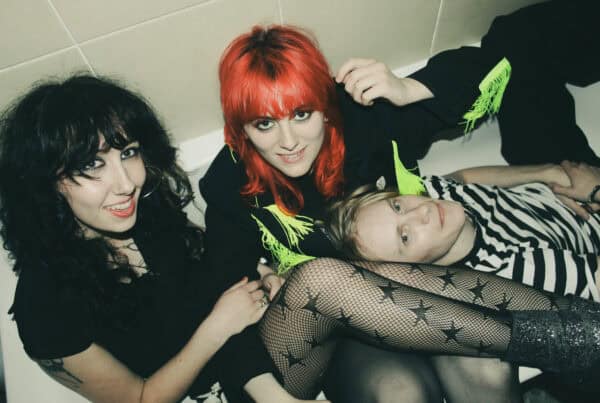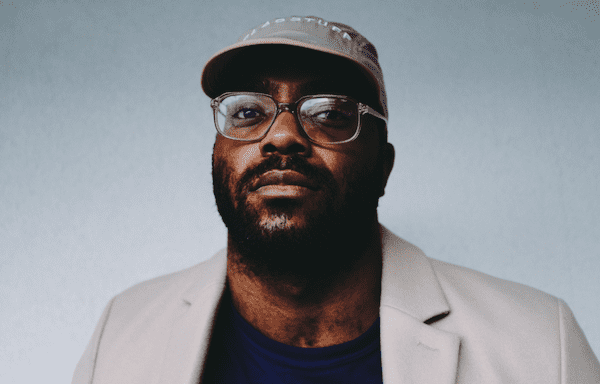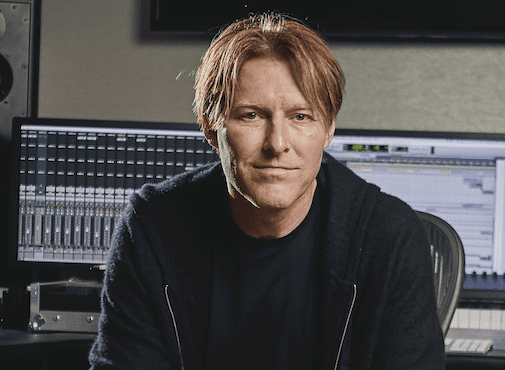Matt Seymour is a broadcast journalist with eight years experience working at the BBC in York. Fuelled by his passion for promoting the local music scene via his show ‘Introducing in York and North Yorkshire’, he has championed bands and music in the North Yorkshire area for his entire career. We catch up with the presenter for our latest industry spotlight to talk about his personal highlights, new music in York and tips for getting a foot in the door.

“I am still surprised at the level of quality we have in North Yorkshire”
S] How did you get started in the radio industry?
MS] I used to be into CB radio and there used to be some pirate radio stations in York in the early 90s and I met some of the people who were involved in that and got a little flavour for doing it. I even built myself an FM transmitter. I had a range of about two streets, and it was designed to impress a girl – it didn’t work! I got into the BBC by accident – a job was advertised in the Press for someone to work on the ‘Where I Live‘ websites. I got a job working on the North Yorkshire one which launched in 2002. That was my way in, and it was technical stuff like HTML coding. The nature of places like the BBC in York is that they are not very big, so once you are in the door you are free to do other things.
We started to do a web radio show – we started doing a band show where we could give artists a place on the web, and this was before MySpace and anything was easy. It was a band directory with lots of resources on it. I started to put together a short show of about 15 minutes with the best bands from that directory – it went down very well. In the meantime, there was something kicking off at Radio Humberside in Hull and a presenter called Alan Raw was working on a programme called ‘Raw Talent‘ which was a really ground-breaking show because it had new music from local bands on local radio which had previously before only catered to over-50s. That was doing really well, and then we ended up taking it and it went across the whole of Yorkshire – I wanted to get involved. Every so often, Alan would bring his show to York and I would engineer it and do the band session. It was always great and Alan did a good job but I always felt that it was very Leeds and Hull-orientated – York and North Yorkshire got missed out, which was nobody’s fault it’s just that the perception is that both cities have bigger scenes. North Yorkshire is so big and there is loads of stuff going on but there’s no epicentre. I pitched an idea to the boss to do a pre-recorded show that compliments what they are doing – we did that and we are still here. There’s no magic route in, I just fell into it.
S] What kind of skills do you need to succeed in the radio industry?
MS] Radio is about telling stories, and whether that is the more ‘hard nosed’ news journalism or ‘fluffy’ people’s stories, or music and bands. It’s about them. I think that the biggest mistake people make when starting out in broadcasting is that they make the programme about themselves – when I do a radio show I take as much of myself out as possible because it needs to be about the bands. There’s all sorts of practical skills about how to do the editing but you can learn all that. The most important thing that people need is to be interested in who they are talking to.
S] You are right in the centre of York and in an ideal location for students at York St John’s and York University, so in terms of them coming to you for advice and support on getting in – how would you advice they approach that?
MS] The official route is really difficult because the BBC has work experience placements and they are hotly contested and there’s not very many of them. It’s hard. I can provide a bit of a back-door really! I am always looking out for people who are interested in music and want to use that passion – whether it’s reviewing albums or gigs there are loads of opportunities to get experience in radio through the introducing programmes. I like letting people have a go! It would all be done on your own time, and it’s voluntary but the way I look at it is it will give you a bit of a flavour for what it’s about and how to do it, and I will give people feedback and provide people with some useful information!
S] What keeps you inspired to keep working on the scene in York?
MS] I am from York. I was born here and I have always live here. I have often said that if York had a motto it would be, ‘Ah, there’s no point’. There is a lot of apathy here which is frustrating actually and it is hard to get past that but there is so much talent here and these people do fantastic things. It’s a real privilege to do what introducing does and take that really raw talent who haven’t developed their potential fully, and give them that platform and put them on the radio. For some people that is a really big deal. For those with more experience we have got the platform of the Introducing stages at Reading and Leeds Festivals. We have had a North Yorkshire act play the festival for the last few years and we’ve also had North Yorkshire acts at Glastonbury on the Introducing stages there as well. That for me, is what it is about. I can spot someone and then put them out there and give them that ‘leg up’. That does make it sound like I’m doing more than I feel I am, but I feel like my role is a filter for both good and bad music in the area. I am still surprised after six years, about the level of quality that we have in this area. Just being able to take an act, like the Hungry Ghosts from York and put them forward to play on a major festival stage, that’s just great!
S] What’s been the defining moment in your career so far?
MS] I know I have said that it’s not all about me. I have done a couple of pieces for Radio One and that’s really nice. It’s the big stage of radio and I did a piece for them on Elliot Minor, but to be producing something for prime-time Radio One, that’s pretty cool! Beyond that, the thing that I love is when I meet someone who listens to the show and then we chat about music and they appreciate the stuff that I have played enough to support the band by buying their CD.
S] Where will you move next in the BBC?
MS] I think the beauty of it is that it is such a big organisation, but because of that it can sometimes seem quite daunting. It can seem very difficult to get in, and it can also seem difficult to move around once you are in. If I wanted to go on to do other stuff in the BBC wherever that was then, I probably could. The reality is that I am committed to York. I don’t know how much longer I will be doing the show and I don’t know how much longer I’ll be working for the BBC! Who can say? What I do know is that I want to stay in York for various reasons. Obviously, you can do great things if you go off to somewhere like Radio One, but I think there is a danger than you can get swallowed up by the ‘metropolis’. It’s a brilliant career, and if you set out to have one in radio then you can do what you like, it just depends where you want to go, and how much you want to give. There are a huge number of possibilities.
S] Going back the beginning, where you built your own FM transmitter – not everyone has those skills though, so how important is it to get experience and perhaps even create opportunities for yourself when they are starting out?
MS] You say not everyone has those skills, and that’s interesting because I probably don’t even have them now – that was all to do with electronics! I don’t do that kind of thing any moree but really, how easy is it for you to go to a gig and do a review of it then stick it on AudioBoo, on iTunes or a podcast? Everyone is doing that now. You can go out to a gig and take some photos, record some audio and stick that on a blog using your phone – that blog can be live within five minutes of the show being over. There is a huge immediacy in media at the moment, and what I always say is that, with radio, ‘you either get it, or you don’t’. This is a magazine, whether it’s on a website or on the printed page, you have to know how to write because if you can’t do that it doesn’t matter how much you know, or how valid your opinions are because nobody is really going to read it because it’s going to be dull. It is exactly the same with radio – do you get it? Can you do the narrative and make it snappy? Most of the time, people who are interested in the radio, listen to it and are familiar with it. I spent a number of years listening to radio before I started out, it gives away my age but I used to tape the Top 40 every week – when you listen to any sort of media, you subconsciously learn how it works. There are all sorts of ways and means that you can set things up or volunteer with student radio [there’s one at York University], I’ll tell you that my show is pre-recorded and I put it together sitting at home with a laptop and a mic – that’s how it is recorded. You don’t need a studio to do it. That’s the same with interviews – you don’t have to be Michael Parkinson, you just have to do a little bit of research and know who you are talking too and go for a chat – those are always the best.
S] Who are your current picks for the best bands around North Yorkshire?
MS] Each of these acts is very pop-rock, but I see nothing wrong with that! A lot of people think that pop is a dirty word and I don’t know why it has to be. If it’s commercial and you can make money out of it! Great! The band is called My Forever – they are from Scarborough, Leeds and Thirsk and are spread out all over the place. They just played the Reading and Leeds Introducing stage this year – they had Huw Stevens of Radio One said that they are ‘Ready from the main-stage’. Also, there’s another band who are impressing me right now called Stone Ugly from York and Doncaster – they’re very young with a great vocalist. They put on a great show and have good songs. If they stick together they are going to get very big. Kasiuss are also another fantastic band coming out – they mix a wide range of sounds and use their instruments really well.
S] What are some of your ideas to move things forward in your career?
MS] I never want to pin myself down too much. I’ve never had any kind of career path. When I used to work at the Deep Pan Pizza Company on Clifton Moor, if you’d have said to me that I’d be working at the BBC and doing reports and have my own show in a few years, then I would have said, ‘no way’. So, I don’t know what’s going to happen next but it’s important for me to have a creative outlet. I’ve been doing loads of video work and photography recently. That for me is what it is important – I need to be able to have that creative outlet and make some money, so if they go together, then that’s great!
S] Radio goes well most of the time, but there are obviously some problems that occur – have there been any nightmarish stories for you?
MS] I have had all sorts of problems doing live broadcasts when the battery has run out on the radio car and I’ve been out and the equipment has failed because a bird has landed on our satellite dish and all these kinds of things but in terms of my show, the biggest horror story has to be Hijack Oscar. We had them on twice and it was when the show used to be live. The first time we had them on in an interview they swore and the second time, they were in the middle of performing live for us and they shouted, ‘Come on mother ****ers’ and it went on like that! It wasn’t what I needed at that time. Nobody complained fortunately. I think that because the show isn’t live now, that’s the bit I miss that live element. Bit, in a sense, it is probably for the best that these things can’t happen!
For more information visit the BBC North Yorkshire Introducing website.
Matt‘s show is on from 6-7pm on a Saturday evening on BBC Radio York, and to listen back to on iPlayer.






